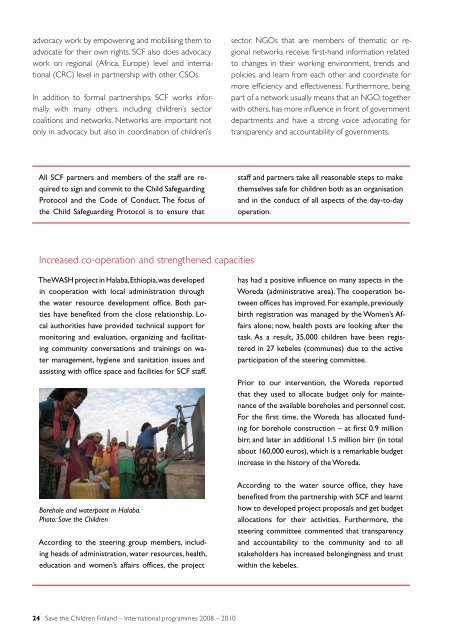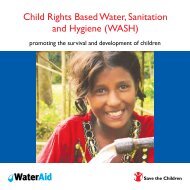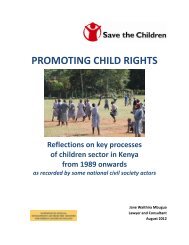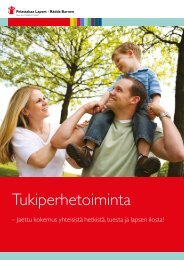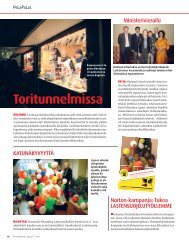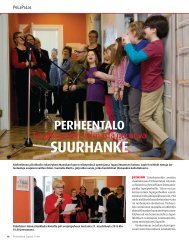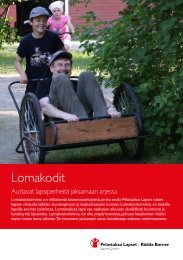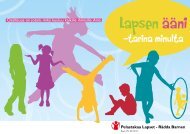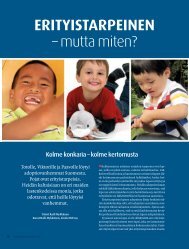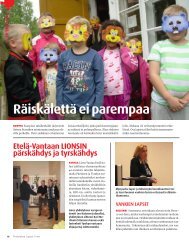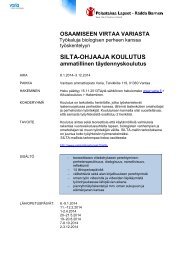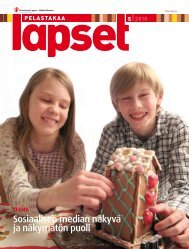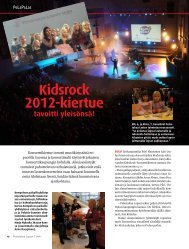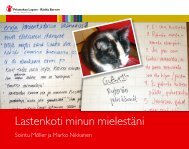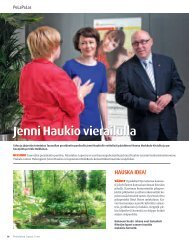Save the Children Finland International Programmes 2008 â 2010
Save the Children Finland International Programmes 2008 â 2010
Save the Children Finland International Programmes 2008 â 2010
Create successful ePaper yourself
Turn your PDF publications into a flip-book with our unique Google optimized e-Paper software.
advocacy work by empowering and mobilising <strong>the</strong>m to<br />
advocate for <strong>the</strong>ir own rights. SCF also does advocacy<br />
work on regional (Africa, Europe) level and international<br />
(CRC) level in partnership with o<strong>the</strong>r CSOs.<br />
In addition to formal partnerships, SCF works informally<br />
with many o<strong>the</strong>rs, including children’s sector<br />
coalitions and networks. Networks are important not<br />
only in advocacy but also in coordination of children’s<br />
sector. NGOs that are members of <strong>the</strong>matic or regional<br />
networks receive first-hand information related<br />
to changes in <strong>the</strong>ir working environment, trends and<br />
policies, and learn from each o<strong>the</strong>r and coordinate for<br />
more efficiency and effectiveness. Fur<strong>the</strong>rmore, being<br />
part of a network usually means that an NGO, toge<strong>the</strong>r<br />
with o<strong>the</strong>rs, has more influence in front of government<br />
departments and have a strong voice advocating for<br />
transparency and accountability of governments.<br />
All SCF partners and members of <strong>the</strong> staff are required<br />
to sign and commit to <strong>the</strong> Child Safeguarding<br />
Protocol and <strong>the</strong> Code of Conduct. The focus of<br />
<strong>the</strong> Child Safeguarding Protocol is to ensure that<br />
staff and partners take all reasonable steps to make<br />
<strong>the</strong>mselves safe for children both as an organisation<br />
and in <strong>the</strong> conduct of all aspects of <strong>the</strong> day-to-day<br />
operation.<br />
Increased co-operation and streng<strong>the</strong>ned capacities<br />
The WASH project in Halaba, Ethiopia, was developed<br />
in cooperation with local administration through<br />
<strong>the</strong> water resource development office. Both parties<br />
have benefited from <strong>the</strong> close relationship. Local<br />
authorities have provided technical support for<br />
monitoring and evaluation, organizing and facilitating<br />
community conversations and trainings on water<br />
management, hygiene and sanitation issues and<br />
assisting with office space and facilities for SCF staff.<br />
has had a positive influence on many aspects in <strong>the</strong><br />
Woreda (administrative area). The cooperation between<br />
offices has improved. For example, previously<br />
birth registration was managed by <strong>the</strong> Women’s Affairs<br />
alone; now, health posts are looking after <strong>the</strong><br />
task. As a result, 35,000 children have been registered<br />
in 27 kebeles (communes) due to <strong>the</strong> active<br />
participation of <strong>the</strong> steering committee.<br />
Prior to our intervention, <strong>the</strong> Woreda reported<br />
that <strong>the</strong>y used to allocate budget only for maintenance<br />
of <strong>the</strong> available boreholes and personnel cost.<br />
For <strong>the</strong> first time, <strong>the</strong> Woreda has allocated funding<br />
for borehole construction – at first 0.9 million<br />
birr, and later an additional 1.5 million birr (in total<br />
about 160,000 euros), which is a remarkable budget<br />
increase in <strong>the</strong> history of <strong>the</strong> Woreda.<br />
Borehole and waterpoint in Halaba.<br />
Photo: <strong>Save</strong> <strong>the</strong> <strong>Children</strong><br />
According to <strong>the</strong> steering group members, including<br />
heads of administration, water resources, health,<br />
education and women’s affairs offices, <strong>the</strong> project<br />
According to <strong>the</strong> water source office, <strong>the</strong>y have<br />
benefited from <strong>the</strong> partnership with SCF and learnt<br />
how to developed project proposals and get budget<br />
allocations for <strong>the</strong>ir activities. Fur<strong>the</strong>rmore, <strong>the</strong><br />
steering committee commented that transparency<br />
and accountability to <strong>the</strong> community and to all<br />
stakeholders has increased belongingness and trust<br />
within <strong>the</strong> kebeles.<br />
24 <strong>Save</strong> <strong>the</strong> <strong>Children</strong> <strong>Finland</strong> – <strong>International</strong> programmes <strong>2008</strong> – <strong>2010</strong>


